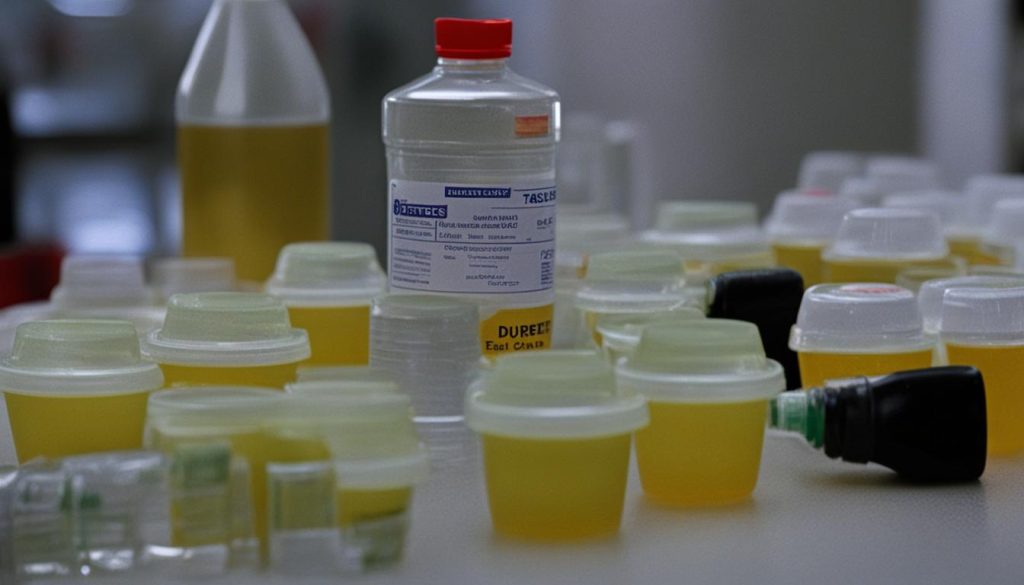
When it comes to drug testing, diuretics have become a topic of concern. These drugs, which increase urine flow and sodium excretion, are commonly used to regulate body fluids. However, they have also found popularity among athletes looking for rapid weight loss and a way to mask the presence of banned substances. As a result, diuretics have been included on the World Anti-Doping Agency’s list of prohibited substances, and anti-doping laboratories regularly screen for their use.
In this section, we will provide an overview of the usage and risks associated with diuretics in drug testing. Understanding the role of diuretics in drug tests is crucial to ensure accurate results and maintain the integrity of sports competitions.
Key Takeaways:
- Diuretics are drugs that increase urine flow and sodium excretion.
- Athletes often misuse diuretics for rapid weight loss and to mask banned substances.
- The World Anti-Doping Agency prohibits the use of diuretics in sports.
- Diuretics have different types and can have potential side effects.
- Analyzing diuretics in drug testing can be challenging for anti-doping laboratories.
Types of Diuretics
Diuretics are classified into several major categories based on their mechanism of action and effects on urinary composition. Understanding the different types of diuretics is essential for their proper usage and interpretation of drug test results.
High Ceiling Loop Diuretics
High ceiling loop diuretics, such as furosemide, act on the ascending loop of Henle in the kidneys, inhibiting the reabsorption of sodium and chloride. This leads to increased urine flow and sodium excretion. These diuretics are commonly used in the treatment of conditions like edema and hypertension.
Thiazides
Thiazides, including hydrochlorothiazide, work by inhibiting the reabsorption of sodium and chloride in the distal convoluted tubules of the kidneys. They are often prescribed for the management of high blood pressure and are generally well-tolerated. However, thiazides can cause electrolyte imbalances, particularly low potassium levels.
Potassium-Sparing Diuretics
Potassium-sparing diuretics, such as spironolactone, exert their effects by blocking the action of aldosterone, a hormone that promotes the reabsorption of sodium and the excretion of potassium. These diuretics are often used to reduce fluid retention in conditions like heart failure and liver cirrhosis.
| Type of Diuretic | Mechanism of Action | Indications | Common Side Effects |
|---|---|---|---|
| High Ceiling Loop Diuretics | Inhibit reabsorption of sodium and chloride in the ascending loop of Henle | Edema, hypertension | Electrolyte imbalances, dehydration, muscle cramps |
| Thiazides | Inhibit reabsorption of sodium and chloride in the distal convoluted tubules | High blood pressure | Electrolyte imbalances (particularly low potassium levels), dizziness |
| Potassium-Sparing Diuretics | Block the action of aldosterone to reduce sodium reabsorption and increase potassium retention | Fluid retention, heart failure, liver cirrhosis | Hyperkalemia (high potassium levels), gynecomastia (in males) |
It is important to note that the usage of diuretics should always be under medical supervision due to potential side effects and interactions with other medications. By understanding the different types of diuretics and their specific indications and potential side effects, healthcare professionals can ensure safe and effective treatment for their patients.
Diuretics in Sports Doping
The use of diuretics in sports doping has become a significant concern in the world of athletics. Diuretics, which are drugs that increase urine production, have been found to provide athletes with several advantages that can enhance their performance. One of the primary reasons athletes turn to diuretics is to meet specific weight categories, especially in sports where weight is a determining factor, such as boxing and wrestling.
By causing rapid weight loss through increased urine output, diuretics enable athletes to quickly shed excess pounds and compete in lower weight divisions. This gives them a competitive edge over opponents who may not have the same ability to manipulate their weight in such a manner. Additionally, diuretics can be used to mask the presence of other banned substances in drug testing.
By diluting the concentration of these substances in urine, diuretics make it more challenging for anti-doping laboratories to detect their use. This is a significant concern for sports organizations, as it undermines the integrity of fair competition and jeopardizes the health and safety of athletes. As a result, the World Anti-Doping Agency (WADA) strictly prohibits the use of diuretics in sports doping, and athletes found using these substances may face severe penalties, including disqualification and bans from competition.
Despite the efforts of anti-doping authorities, detecting the use of diuretics remains a challenge. The misuse of diuretics in sports doping highlights the ongoing battle between athletes looking for an unfair advantage and anti-doping organizations striving to maintain a level playing field. The development of more advanced and sensitive testing methods is crucial to effectively combat the use of diuretics in sports doping and ensure the integrity of competitive sports.
Pharmacology and Toxicology of Diuretics
Diuretics, as mentioned earlier, are drugs that alter the renal absorption and excretion of various ions and compounds, thereby affecting the volume and composition of urine. The pharmacological and toxicological properties of diuretics vary depending on the specific type of diuretic used. Understanding these properties is crucial for their proper usage and interpretation of drug test results.
In terms of pharmacology, diuretics act through different mechanisms to increase the excretion of sodium and water. High ceiling loop diuretics, for example, inhibit the sodium-potassium-chloride co-transporter in the thick ascending limb of the loop of Henle, leading to increased sodium excretion. Thiazide diuretics, on the other hand, inhibit the sodium-chloride co-transporter in the distal convoluted tubule, resulting in increased sodium and water excretion. Potassium-sparing diuretics, as the name suggests, reduce sodium reabsorption while sparing potassium excretion. These pharmacological actions contribute to the diuretic effects of each specific type of diuretic.
In terms of toxicology, diuretics can have potential adverse effects on the body. Electrolyte imbalances, such as low sodium and potassium levels, can occur with diuretic usage. These imbalances can lead to dizziness, muscle cramps, and in severe cases, life-threatening heartbeat problems. Dehydration is another concern, as excessive water loss can disrupt the body’s fluid balance. It is important to note that the extent and likelihood of these toxicological effects vary depending on the type and dosage of the diuretic used.
Table: Types of Diuretics and Their Pharmacological Actions
| Type of Diuretic | Pharmacological Action |
|---|---|
| High ceiling loop diuretics | Inhibit sodium-potassium-chloride co-transporter in the thick ascending limb of the loop of Henle |
| Thiazide diuretics | Inhibit sodium-chloride co-transporter in the distal convoluted tubule |
| Potassium-sparing diuretics | Reduce sodium reabsorption while sparing potassium excretion |
As illustrated in the table above, different types of diuretics exert their effects through specific pharmacological actions. These actions influence the excretion of sodium, water, and other ions in the kidneys, ultimately leading to diuresis. However, it is crucial to consider the possible toxicological effects of diuretics, such as electrolyte imbalances and dehydration, when using them for medical or performance-enhancing purposes.
Analysis of Diuretics in Drug Testing
When it comes to drug testing, the analysis of diuretics poses a significant challenge. Anti-doping laboratories employ various analytical strategies to detect diuretics in urine samples. Gas chromatography/mass spectrometry (GC/MS) and liquid chromatography/mass spectrometry (LC/MS-MS) are commonly used methods for this purpose. These advanced techniques have evolved over time to enhance the detection of diuretics, but the diverse nature of diuretic compounds complicates their analysis.
The heterogeneity of diuretics makes it difficult to develop a single, universal method for their identification. Different types of diuretics have varying chemical structures, resulting in differences in their retention times and mass spectra. This necessitates the use of multiple analytical techniques and reference standards to accurately identify and quantify diuretics in urine samples.
Furthermore, the presence of other substances in urine can interfere with the analysis of diuretics. Matrix effects, such as ion suppression or enhancement, can affect the accuracy and reliability of the results. Careful sample preparation and the use of appropriate extraction and clean-up techniques are crucial in minimizing these matrix effects and ensuring accurate analysis.
| Challenges in the Analysis of Diuretics | Solutions |
|---|---|
| Diverse chemical structures of diuretics | Employ multiple analytical techniques and reference standards |
| Potential interference from other substances in urine | Implement rigorous sample preparation and extraction protocols |
| Matrix effects affecting accuracy and reliability | Use appropriate clean-up techniques to minimize matrix effects |
“The analysis of diuretics in drug testing requires sophisticated analytical techniques and careful attention to detail. The diverse nature of diuretic compounds and potential interference from other substances in urine pose significant challenges. However, with the use of advanced analytical methods and strict protocols, anti-doping laboratories can accurately detect and identify diuretics, ensuring the integrity of drug testing.”
In conclusion, the analysis of diuretics in drug testing demands thorough understanding and expertise. Anti-doping laboratories continue to refine their analytical methods to overcome the challenges presented by the diverse nature of diuretic compounds. By employing multiple analytical techniques, implementing rigorous sample preparation and extraction protocols, and minimizing matrix effects, reliable analysis of diuretics in urine samples can be achieved.

Abuse of Diuretics for Weight Loss
Diuretics are sometimes abused as a means of achieving rapid weight loss. This practice is particularly prevalent among individuals with eating disorders or those striving for a quick fix to shed pounds. However, it is important to recognize that abusing diuretics for weight loss is both unethical and dangerous. While diuretics can lead to temporary weight loss by reducing water retention, they do not promote long-term fat loss and can have detrimental effects on overall health.
The abuse of diuretics for weight loss can result in severe dehydration, electrolyte imbalances, and even kidney damage. By increasing urine production, diuretics can cause the body to lose essential minerals and electrolytes, such as sodium and potassium. This imbalance can lead to muscle cramps, dizziness, and irregular heart rhythms. Additionally, excessive fluid loss can disrupt the body’s natural hydration levels, impairing various bodily functions.
It is crucial to approach weight loss in a healthy and sustainable manner, rather than resorting to the abuse of diuretics. This entails adopting a balanced diet, engaging in regular physical activity, and seeking professional guidance if needed. By focusing on overall well-being rather than solely on the number on the scale, individuals can achieve lasting results and maintain optimal health.
Remember, diuretics should only be used under medical supervision and for legitimate purposes, such as treating medical conditions or addressing fluid retention issues. The abuse of diuretics for weight loss not only poses significant health risks but also perpetuates unrealistic and harmful beauty standards. Let us prioritize our well-being and embrace a holistic approach to weight management.

Diuretics and Performance-Enhancing Substances
Diuretics have been found to be a popular choice among athletes seeking to enhance their performance by masking the presence of other banned substances. By increasing urine volume and promoting frequent urination, diuretics can dilute the concentration of performance-enhancing substances in urine, making their detection more challenging. This manipulation of urine composition allows athletes to potentially avoid detection during drug testing.
The use of diuretics in combination with other banned substances is considered cheating and is strictly prohibited in sports. The World Anti-Doping Agency (WADA) has identified diuretics as prohibited substances and has implemented stringent measures to detect their use in athletes. Anti-doping laboratories employ sophisticated analytical methods, such as gas chromatography/mass spectrometry (GC/MS) and liquid chromatography/mass spectrometry (LC/MS-MS), to analyze urine samples for the presence of diuretics.
“By using diuretics, athletes not only enhance their performance but also put their health at risk and compromise the integrity of the sport.”
The misuse of diuretics in sports undermines the principles of fair competition and poses serious health risks to athletes. The excessive use of diuretics can lead to dehydration, electrolyte imbalances, and potentially life-threatening conditions. It is crucial for athletes to understand the consequences of using diuretics as performance-enhancing substances and to adhere to the strict anti-doping regulations set forth by sports governing bodies.
| Diuretic Usage in Sports | Consequences |
|---|---|
| Masking the presence of banned substances | Unfair advantage in competition |
| Rapid weight loss for weight category sports | Potential dehydration and electrolyte imbalances |
| Compromising the integrity of the sport | Health risks and ethical concerns |
Side Effects of Diuretics
Diuretics, although commonly used for various purposes, can have potential side effects that need to be considered. The most common side effect of diuretics is increased urination, which can lead to dehydration if fluid intake is not adequately maintained. Additionally, diuretics can cause electrolyte imbalances, such as low sodium and potassium levels, which can result in dizziness, muscle cramps, and even life-threatening heartbeat problems in the case of thiazide diuretics. It is crucial to be aware of these potential side effects and use diuretics under medical supervision to minimize any risks.
In addition to the immediate side effects, long-term use of diuretics can have other implications. The continuous loss of water and electrolytes can affect the body’s natural balance and lead to chronic dehydration, which can have various negative effects on overall health and well-being. Furthermore, frequent and excessive use of diuretics can result in a tolerance to their effects, requiring higher dosages to achieve the desired outcome. This can potentially contribute to a cycle of dependency and further health complications.
It is essential to recognize the potential side effects of diuretic usage and take necessary precautions. Regular monitoring of electrolyte levels and hydration status is crucial when using diuretics, especially for individuals with pre-existing medical conditions or those at a higher risk of electrolyte imbalances. Combining diuretics with a balanced diet and lifestyle modifications can help minimize the risk of side effects and optimize their usage.
Side Effects Summary:
- Increased urination and potential dehydration
- Electrolyte imbalances, such as low sodium and potassium levels
- Dizziness, muscle cramps, and potential heartbeat problems
- Chronic dehydration and potential long-term health implications
- Tolerance development and dependency on higher dosages

| Side Effects | Precautions |
|---|---|
| Increased urination and potential dehydration | Ensure adequate fluid intake and monitor hydration status |
| Electrolyte imbalances, such as low sodium and potassium levels | Regular monitoring of electrolyte levels and supplementation if necessary |
| Dizziness, muscle cramps, and potential heartbeat problems | Seek medical advice if experiencing severe or persistent symptoms |
| Chronic dehydration and potential long-term health implications | Combine diuretic usage with a balanced diet and lifestyle modifications |
| Tolerance development and dependency on higher dosages | Use diuretics as prescribed and under medical supervision |
Diuretics and High Blood Pressure
Diuretics are commonly prescribed for the treatment of high blood pressure, also known as hypertension. They help lower blood pressure by promoting the excretion of salt and water through urine, reducing fluid buildup in the body. Thiazide diuretics, in particular, are often recommended as first-line treatment for hypertension.
| Type of Diuretic | Mechanism of Action | Examples |
|---|---|---|
| Thiazide diuretics | Inhibits sodium reabsorption in the distal convoluted tubule of the kidneys | Hydrochlorothiazide, chlorthalidone |
| Loop diuretics | Inhibits sodium reabsorption in the ascending loop of Henle | Furosemide, bumetanide |
| Potassium-sparing diuretics | Interferes with the sodium-potassium exchange in the distal convoluted tubule | Spironolactone, amiloride |
Diuretics are effective in managing high blood pressure because they reduce the volume of blood circulating through the blood vessels, leading to decreased pressure on the vessel walls. This helps prevent complications associated with hypertension, such as heart attack, stroke, and kidney damage. It is important to note that diuretics may be used alone or in combination with other antihypertensive medications based on individual patient needs.
While diuretics are generally well-tolerated, they can sometimes cause side effects such as increased urination, electrolyte imbalances, dizziness, muscle cramps, and dehydration. Regular monitoring of blood pressure and electrolyte levels is important when using diuretics. It is also essential to follow the prescribed dosage and consult with a healthcare professional for proper guidance and management of hypertension.
Alternative Approaches to Detoxification
When it comes to detoxification, there are alternative approaches that can be explored, providing effective results without the need for diuretics. These methods focus on enhancing the body’s natural detoxification processes, promoting overall health and well-being. Let’s take a look at some of the alternative approaches that can be considered:
Natural Remedies:
Many natural remedies can aid in detoxification. Herbal teas, such as dandelion tea and green tea, have been known for their detoxifying properties. These teas contain antioxidants that help flush out toxins from the body. Additionally, certain foods like dark leafy greens, garlic, and lemon water can support the detoxification process by boosting liver and kidney function.
Lifestyle Changes:
Implementing lifestyle changes can also contribute to effective detoxification. Regular exercise helps stimulate blood circulation and enhances lymphatic system function, aiding in the elimination of toxins. Practicing stress-reducing techniques, such as meditation and deep breathing exercises, can also support the body’s natural detoxification processes.
Healthy Diet:
A balanced and nutritious diet plays a vital role in detoxification. By eliminating processed foods, sugars, and artificial additives, and focusing on whole foods like fruits, vegetables, and lean proteins, the body can obtain the necessary nutrients to support optimal detoxification. Additionally, staying hydrated by drinking an adequate amount of water throughout the day is crucial for flushing out toxins.
| Alternative Approaches to Detoxification | Benefits |
|---|---|
| Natural Remedies | – Antioxidant properties of herbal teas aid in toxin elimination – Foods that support liver and kidney function – Promotes overall well-being |
| Lifestyle Changes | – Exercise stimulates blood circulation and enhances lymphatic system function – Stress-reducing techniques support natural detoxification – Improves overall health |
| Healthy Diet | – Balanced and nutritious diet supports optimal detoxification – Elimination of processed foods and artificial additives – Adequate hydration for toxin elimination |
By incorporating these alternative approaches to detoxification, individuals can achieve effective results while prioritizing their health and well-being. It is important to consult with a healthcare professional or nutritionist before making any significant changes to one’s diet or lifestyle to ensure it aligns with individual needs and goals.
“Our bodies have natural detoxification processes, and by adopting alternative approaches to detoxification, we can support these processes and promote overall health and well-being.”
Conclusion
In conclusion, diuretics play a significant role in drug testing, particularly in the detection of banned substances and masking agents. The usage of diuretics in sports doping is strictly prohibited by organizations like the World Anti-Doping Agency (WADA). Their abuse for weight loss purposes is not only unethical but also dangerous to one’s health.
When considering diuretics for detoxification purposes, it is crucial to use them under medical supervision to minimize the risk of side effects. Diuretics can be effective in promoting the excretion of salt and water through urine, aiding in the elimination of toxins from the body. However, it is important to understand their pharmacological and toxicological aspects to ensure safe usage.
Additionally, it is worth noting that there are alternative approaches to detoxification that do not involve the use of diuretics. Natural remedies, such as herbal teas, certain foods, and lifestyle changes, can support the body’s natural detoxification process. These approaches focus on promoting liver and kidney function, enhancing fluid elimination, and supporting overall health and well-being.
By understanding the usage and risks of diuretics, individuals can make informed decisions regarding their use in detoxification and drug testing. It is crucial to prioritize health and safety, and to consider alternative approaches to detoxification that complement the use of diuretics. Ultimately, a holistic approach to detoxification can offer long-lasting benefits for overall well-being.
FAQ
What are diuretics?
Diuretics are drugs that increase the rate of urine flow and sodium excretion, commonly used to adjust the volume and composition of body fluids.
Why are diuretics prohibited in sports doping?
Diuretics are used by athletes for rapid weight loss and to mask the presence of banned substances, making their use in sports doping strictly prohibited.
What are the different types of diuretics?
There are several major categories of diuretics, including high ceiling loop diuretics, thiazides, and potassium-sparing diuretics, each with their own mechanism of action and effects on urinary composition.
How do diuretics affect the body?
Diuretics can affect the renal absorption and excretion of various ions and compounds, such as sodium, chloride, potassium, and uric acid, which can have pharmacological and toxicological effects.
How are diuretics detected in drug testing?
Anti-doping laboratories use analytical methods such as gas chromatography/mass spectrometry (GC/MS) and liquid chromatography/mass spectrometry (LC/MS-MS) to analyze urine samples for the presence of diuretics.
What are the risks of abusing diuretics for weight loss?
Diuretic abuse for weight loss can lead to serious health consequences such as dehydration, electrolyte imbalances, and other side effects.
How do diuretics interact with performance-enhancing substances?
By increasing urine volume, diuretics can dilute the concentration of performance-enhancing substances in urine, making their detection more challenging.
What are the potential side effects of diuretic usage?
Diuretics can cause increased urination, electrolyte imbalances, dizziness, muscle cramps, and dehydration, with thiazide diuretics particularly posing a risk for low potassium levels and heartbeat problems.
How are diuretics used in the treatment of high blood pressure?
Diuretics are commonly used to reduce fluid buildup in the body and lower blood pressure by promoting the excretion of salt and water through urine, with thiazide diuretics often recommended as initial treatment for hypertension.
Are there alternative approaches to detoxification that don’t involve diuretics?
Yes, natural remedies, herbal teas, certain foods, and lifestyle changes can aid in the body’s natural detoxification process without the use of diuretics.
















